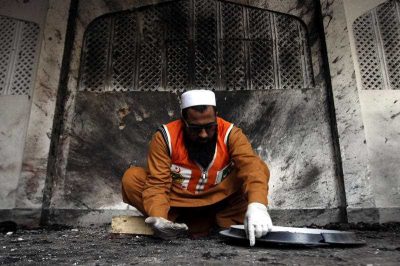
In August 2015, Pakistan’s Supreme Court, which has a history of validating military takeovers under the ‘doctrine of necessity’, upheld the 21st amendment to the constitution allowing military courts to be established parallel to the existing civil judiciary for two years.
The amendment allows civilians ‘claiming [to] or [who] are known to belong to any terrorist group or organisation using the name of religion or sect’ to be tried by the military courts provided their cases are referred by the federal government. This formulation presented a civilian façade but, in reality, it will mean that the military decides who is to be brought before the military tribunal.
Prime Minister Nawaz Sharif, during one of his rare appearances in the parliament, reiterated that such extraordinary times needed extraordinary steps. The parliament passed the amendment in the wake of terrorist attack on the Army Public School in Peshawar in December 2014, which killed over 150 children and teachers.
The December mayhem shook Pakistan and, with public support behind them, the military assumed the lead in fight against terrorism. Despite early rumblings by some mavericks in the parliament, no one could withstand pressure from the army and voted in support of the amendment. Pakistan has lost over 58,000 people in terrorist related incidents since 2003. Thousands more have been killed in sectarian and targeted killings. And, according to the 2014–15 Economic Survey, Pakistan has suffered US$107 billion in economic losses since the 11 September terrorist attacks. Against this backdrop, military courts seemed like the right solution.
The 900 page judgment on the constitutional amendment, and the dissenting notes, demonstrates a deep divide over key questions ranging from how to define a terrorist and how the states should treat them, to concerns over the legality of government responses to the menace of terrorism. In light of these divisions, the Supreme Court chose the middle ground and decided to allow military courts — while still retaining judicial review over their decisions.
Judges dissenting with the majority opinion — including Justice Jawwad Khawaja, the incoming Chief Justice — believe that the parliament does not have unlimited powers to enact amendments to the constitution. The amendment ‘is liable to be struck down,’ according to these judges.
As expected the decision drew mixed reactions. While politicians praised the decision, the jurists’ bodies and civil society organisations considered allowing military courts a blow to human rights and rule of law in Pakistan. Some have labelled the decision as a resort to the ‘doctrine of necessity’ under which the Supreme Court has legalised almost all military takeovers in Pakistan.
But most critics of the amendment do not appreciate that Pakistan’s criminal justice system has been unable to cope with the nature and number of crimes committed. The conviction rate, in a country ridden with terrorism, remains below 10 per cent according to an International Crises Group report. And a 2011 State Department Report considered Pakistan incapable of prosecuting terror related suspects.
Civilian review processes can lead to frustrating delays in eliminating terrorism. Various interest groups and bureaucratic manipulations can make the procedures cumbersome, grounding the process to a halt. In the backdrop of civilian leadership’s earlier dithering, the army and the people of Pakistan have increasingly refused to accept any impediments to the effective dispensation of justice and closure of cases.
There has been a perceptible decline in terror cases since the army action began and the military courts have taken over the judicial process. Except for some muted civil society voices, the public at large seem happy with the army’s doggedness in pursuing terrorists.
The predominant fear among civil society groups is that the life of military courts might be extended beyond the current two years. But at the same time Pakistan’s civilian courts, including its Supreme Court, had been powerless in getting executive government to enforce their judgments. Now, the entire process is military controlled and carried out in complete secrecy, beginning with the appointment of military judges to the trial itself. Even death sentences are confirmed or commuted by the Chief of Army Staff, who moves with alacrity.
In a country that has lost thousands in terrorism related crimes it seems that societal peace, not secrecy, is the main issue.
This article has been republished from eastasiaforum.org.